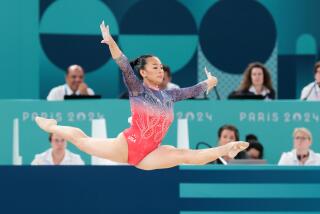Kubiak Finds Measure of Victory in Olympic Trials Disappointment
- Share via
To paraphrase Oliver Hazard Perry, Jeff Kubiak has met the enemy and the enemy is his.
His friend, that is. Kubiak and Kirk Stackle never really were enemies, but it wasn’t easy for Kubiak to handle Stackle nipping him by 12 hundredths of a second in the final of the 1988 Olympic Trials 200-meter breaststroke.
By finishing second, Stackle won a trip to Seoul. Kubiak, a former Cal State Northridge swimmer, was left with some soul-searching.
This spring, Kubiak decided to join Stackle after he couldn’t beat him, and the two train together with Longhorn Aquatics in Austin, Tex. The arrangement has been mutually beneficial.
“It’s great training with him because we work well together,” Kubiak said of Stackle, who will be a senior at Texas. “I look at him as a friend and competitor. We push each other and get along great.”
Kubiak and Stackle hooked horns competitively once again Tuesday in the U. S. Senior National Long Course Championships, at the USC Olympic Pool. Kubiak finished fourth in the 100 breaststroke, three frustrating hundredths of a second behind the third-place Stackle.
“I just didn’t make my move early enough,” Kubiak said.
Kubiak, 24, headed for Texas in May, two days after earning his health sciences degree from Northridge. And the breaststroke lane at the Longhorn Aquatics Center has been sizzling ever since.
“There are a bunch of athletes in swimming that like to win, but there are only a few that hate to lose,” said Eddie Reese, the Texas men’s swimming coach. “These two are a pair that hate to lose, and they’ve had some real good practices. They really compete.”
As swimmers, Kubiak and Stackle are a study in contrasts. Kubiak pulls himself through the water with a powerful and rapid arm motion, whereas Stackle pushes himself with a kick like an outboard motor.
“Eddie will tell him different stuff than he’ll tell me,” Stackle said. “Although, obviously, some things are the same. . . . It puts a little extra intensity into workouts because neither one of us wants to get beat.”
The Trials were a Kafkaesque experience in frustration for Kubiak. Not only did Stackle edge him, but Mike Barrowman of Michigan came out of nowhere to cut nearly five seconds off his lifetime best, shatter the national record by more than a second and leave the field in his wake.
Kubiak added a fourth in the 100 breaststroke to his third in the 200, and, as Reese said, “Those are bad places to be in the Olympic Trials.”
Despite being ranked sixth in the world and being the defending Pan-American Games champion in the 200 breaststroke, missing the Olympics was a blow to Kubiak. It was months after the Trials before he had any desire to swim again.
“I tried to get in the water, but I just couldn’t do it,” said Kubiak, who won seven NCAA Division II individual championships in his three years at Northridge. “In February I finally wanted to get back. It just hit me all of a sudden, like a revelation.”
Still, Kubiak replays his memories of the Trials more often than “Bedtime for Bonzo” is shown on late-night television.
“I can’t help it,” Kubiak said. “It’s something that I can’t get out of my mind. There are all those what-ifs, too many to think about.”
Typically stronger in the 200, Kubiak lost a lot of his training base during his layoff. His training also suffered when he picked up a lung infection from swimming indoors in Austin. He is nonetheless confident about the 200 on Thursday.
“I want to win,” Kubiak said. “I think I can win. I wouldn’t be here if I didn’t.”
Once again, Kubiak’s international hopes hinge on a top finish. The winner of each event--as well as several other top finishers--will earn berths on the 20-man team for the Pan-Pacific Games in Tokyo, Aug. 17-20, probably the top meet of the summer.
Kubiak also needs to maintain his top-seven world ranking to keep his $700 monthly stipend from the U. S. Swimming Athletes Assistance Program. Now that he is out of college, Kubiak is supporting himself.
A generation of swimmers hung up their caps after the Olympics, but Kubiak keeps going.
“I don’t think you hit your physical peak until 25 or 26,” Kubiak said. “I think I have a few more good years ahead of me. I want to swim until I can’t improve and have fun anymore, and I’m still doing both. “
Kubiak said that he doesn’t plan to leave Austin for a while, and until he does, Stackle won’t be the lone breaststroke star in Texas.
More to Read
Go beyond the scoreboard
Get the latest on L.A.'s teams in the daily Sports Report newsletter.
You may occasionally receive promotional content from the Los Angeles Times.






